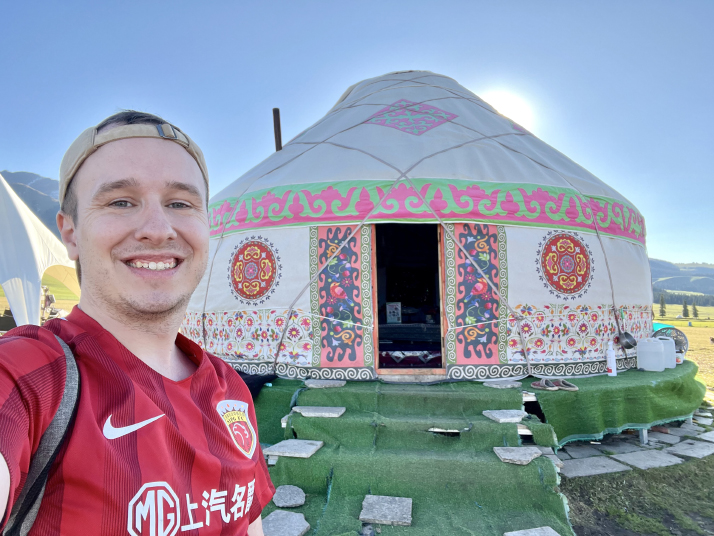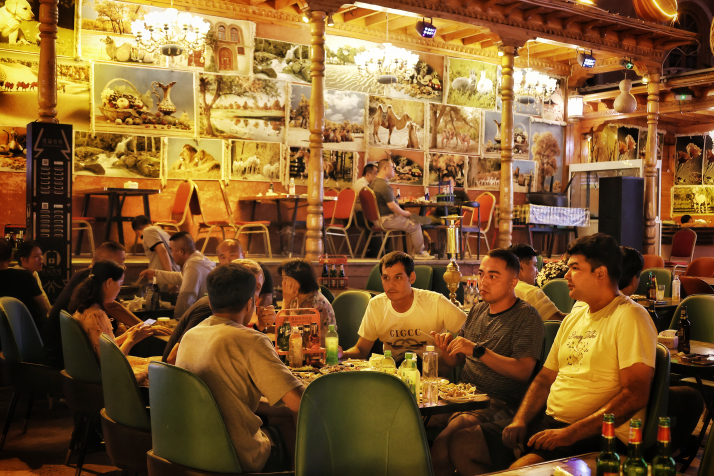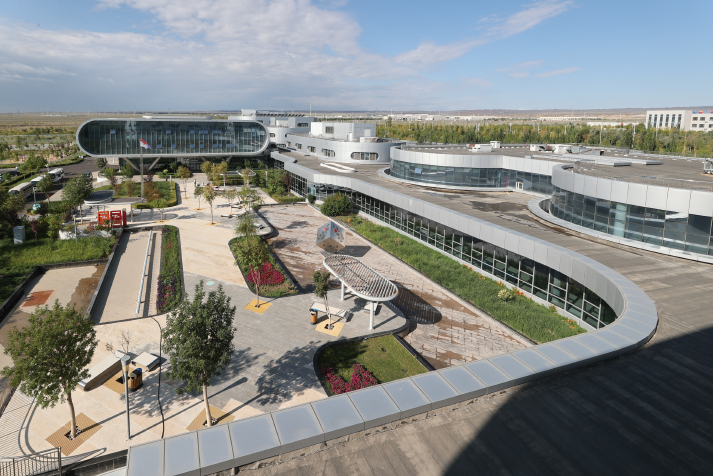| Xinjiang Today |
| Finding home in Xinjiang | |
|
|
 Luke Johnston takes a selfie in front of a Kazak yurt in the Nalati (Narat) Grassland in Ili Kazak Autonomous Prefecture in September 2024 (COURTESY PHOTO)
I have long believed in the soft hum of destiny—a gentle yet persistent voice that calls us to parts unknown, urging us toward places that echo our deepest dreams. In 2021, that melodic invitation first led me to Xinjiang, a land so vast that it joins deserts and grasslands, mountains and skyscrapers, all within a single, breathtaking sweep. Like a lullaby wafting on a desert breeze, Xinjiang called, and I answered.
Stepping off the plane felt like stepping off a precipice of whispered rumors and headlines. Tales heard in Western media had conjured up images of watchful eyes lurking behind every corner. Yet just when I felt the pang of uncertainty—of being a foreign face in a place so new—I was lifted by a sense of hospitality unlike anything I had imagined. And so the journey begins… On my very first day, I set out to interview some Uygur locals for a social media video, hoping to unearth the genuine spirit of Xinjiang. Spotting a group of carefree young folk, covered with tattoos, sipping beer, I felt a little unease—would they be wary of foreigners here in Xinjiang after all the bad press from abroad? Would I land in trouble just for asking questions? As I approached them, it turned out the surprise was all theirs: They exclaimed that I was the first foreigner they had ever met. Laughter soon replaced my nerves, and in a jumble of my broken Chinese and their equally imperfect English, we chatted like old friends who simply hadn't met yet. They insisted on buying me a drink, then generously invited me into their home—an offer I might have hesitated to accept in my own country, where trusting strangers doesn't come so easily. Yet in that moment, hospitality felt natural, even inevitable, and I realized how quickly Xinjiang was shattering my preconceptions. They welcomed me in, poured steaming tea from ornate pots, and laid out a spread of local dishes. This was no ordinary meal. It was an initiation, a baptism by kindness, as if they were saying, "You are here, so you are family now." That day, I learned that here in Xinjiang, food and affection go hand in hand and how easily hearts could open at the sight of a curious stranger. My hosts laughed and danced to the lively rhythms of local music, their feet stamping on colorful rugs in a fervent celebration of life. My hands clapped and my heart soared, buoyed by the sense of belonging that filled the room.  Diners at a restaurant in Kashi (Kashgar) City in August 2024 (VCG)
Lookalikes You see, there is a curious happenstance about my appearance. In a way, I somehow look like the local Uygur people here, with pale skin and large eyes. In the markets and restaurants, passersby would greet me in Uygur with a warm smile. Realizing I wasn't a local, they would laugh and then shift to standard Chinese. I found myself heartened by it, reminded that I could blend in more than I ever expected, and it made me feel more connected to the culture. Traveling to other cities in China, I'd often have gazing eyes fixed on me, as I looked so different from the rest, yet here nobody noticed! This was the kickstarter for me, the moment I yearned to learn the language that had welcomed me so graciously on day one—Uygur. I left Xinjiang after some days, but two years later, in 2023, and again in 2024, I made my way back like a migrating bird returning to warmer climes. Each time, although in different cities, from Kashi (Kashgar), capital of Kashi Prefecture, to Yining, capital of Ili Kazak Autonomous Prefecture, the same warmth greeted me, people inviting me to their homes. Perhaps that is how Xinjiang welcomes wanderers—it gives them its heart so fully that they leave a part of themselves behind, ensuring they must return. So it is because of this, I decided to begin a new chapter and life in Xinjiang. I took the brave decision, which not so many foreigners have done, to move and settle down in Xinjiang. Of course nerves are there, but I already somehow feel this is my home from the first day I landed. Being here, there is so much to explore. I'll truly never be bored. Xinjiang is shockingly seven times bigger than my own country, the United Kingdom, a staggering expanse that houses countless corners I have yet to see. Indeed, I have roamed only a fraction of Xinjiang, because no matter how many times I return, there remain hidden valleys, scorching deserts, and snowy altitudes yet to explore. From Turpan, the hottest place in China, to snowy Altay, where you can imagine yourself in the Alps, with ski slopes galore. The grasslands of Ili were also a wonder, with many Kazaks living and traveling in the mountains in their yurts, herding their livestock along the way. Each city is a kingdom unto itself, with varied languages as well as different customs and dishes that reflect a culture influenced by history—local, Central Asian and beyond. Perhaps one of the reasons Xinjiang brims with diversity is its position on the ancient Silk Road. For centuries, people traversed these pathways, bringing with them goods, ideas and tradition. The region borders eight countries, linking it like a living tapestry to the stories of Russia, Mongolia, Kazakhstan, Kyrgyzstan, Tajikistan, Afghanistan, Pakistan and India. The interplay of so many cultures created a kaleidoscope that dazzles my senses at every turn. It also spurs modern ambition—trade, tourism and technological collaborations. Standing at the crossroads of past and future, Xinjiang holds immeasurable promise for businesses and entrepreneurs who can sense the pulse of progress beating beneath the ancient sands.  A cloud computing complex in Karamay City in September 2023 (VCG)
The next chapter As someone who is about to graduate with a Ph.D. in artificial intelligence (AI) from Shanghai Jiao Tong University, people often ask me, "Why Xinjiang? Wouldn't Beijing or Shanghai be more logical hubs for tech?" But I see beyond the immediate. I look toward the future, imagining how AI might knit together the region's myriad cultures and landscapes. Xinjiang, in particular the city of Karamay, has already begun to explore that path. Known historically for its oil production, Karamay is leaping beyond its past and into a new era powered by state-of-the-art data centers. One of these futuristic facilities, Carbon Neutral Network Technology Co. Ltd.'s data center with a water cooling system that heats offices while keeping equipment cool now powers gigantic AI computations and supports cloud storage for global corporations. Many might not be aware, but China's DeepSeek, a Hangzhou-based tech company that has recently created an impressive AI open-source large language model, shocking the world, collaborated with Xinjiang's Karamay to accomplish this. Xinjiang's location—at the crossroads of Asia and Europe—provides it with logistical advantages. So, with rich natural resources and rapidly modernizing infrastructure, we are starting to see more and more research centers, innovation hubs, and advanced manufacturing facilities being established here, with many AI companies collaborating with Xinjiang, collecting data from here, and helping it become the heart of AI in China. So here I am, back in Xinjiang for another chapter, and my first month has been nothing short of eye-opening. People cautioned that English speakers would be scarce and that every day would bring new communication hurdles. Yet I soon discovered local English corners—enthusiastic gatherings of learners and dreamers who share their experiences in committed, if imperfect, English. Others warned that life here would seem dull compared to the hustle of Shanghai. Instead, I've found a city that pulses with energy well into the early hours of the morning—entire streets transformed into bustling food markets, livehouses echoing with the sounds of local bands, and fireworks blazing each dawn in celebration of Chinese New Year (something Shanghai doesn't allow!). For me, this place is full of nature and peace, and simultaneously full of life. I came to Xinjiang because I was curious, because I felt a pull I could not resist. Xinjiang is a place of open doors, whether in the humble houses that greet you with tea, or in the advanced data centers that pave the way for the future. This is how I came to Xinjiang and why I stay: As I explore this place, I am uncovering aspects of myself that I never knew existed. The author is a British YouTube content creator currently living in Urumqi Comments to ffli@cicgamericas.com |
|
||||||||||||||||||||||||||||
|